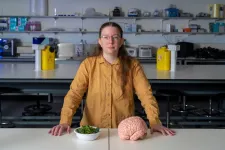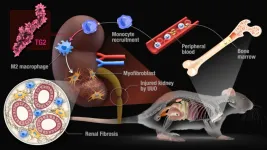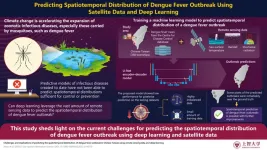(Press-News.org) Despite nearly 60 years of research, there is still a lack of high certainty evidence on the effectiveness and safety of commonly used painkillers (analgesics) for short bouts of low back pain, finds an analysis of the evidence published by The BMJ.
The researchers say that until higher quality trials comparing analgesics with each other are published, “clinicians and patients are advised to take a cautious approach to manage acute non-specific low back pain with analgesic medicines.”
Analgesics such as paracetamol, ibuprofen, and codeine are widely used to treat acute non-specific low back pain, defined as pain lasting less than six weeks. But evidence for their comparative effectiveness is limited.
To fill this knowledge gap, researchers trawled scientific databases for randomised controlled trials comparing analgesic medicines with another analgesic, placebo, or no treatment in patients reporting acute non-specific low back pain.
From an initial 124 relevant trials, they included 98 randomised controlled trials published between 1964 and 2021 in their analysis. These involved 15,134 participants aged 18 and over and 69 different medicines or combinations.
The trials included non-steroidal anti-inflammatory drugs, paracetamol, opioids, anti-convulsant drugs, muscle relaxants and corticosteroids. The researchers assessed their risk of bias using a validated risk tool.
The main measures of interest were low back pain intensity at the end of treatment (on a 0-100 point scale) and safety (number of participants who reported any adverse event during treatment). Average pain intensity among participants at the start of each trial was 65 out of 100.
The researchers noted low or very low confidence in evidence for reduced pain intensity (around 25 points) after treatment with muscle relaxant tolperisone, anti-inflammatory drug aceclofenac plus muscle relaxant tizanidine, and the anti-convulsant drug pregabalin, compared with placebo.
Very low confidence was also noted in evidence for large reductions in pain intensity (around 20 points) for four medicines, such as the muscle relaxant thiocolchicoside and anti-inflammatory drug ketoprofen, moderate reductions (10-20 points) for seven medicines, including anti-inflammatory drugs aceclofenac, etoricoxib and ketorolac, and small reductions (5-10 points) for three medicines including ibuprofen and paracetamol.
Low or very low confidence evidence suggested no difference between the effects of several of these medications.
The researchers noted moderate to very low confidence evidence for increased adverse events, such as nausea, vomiting, drowsiness, dizziness, and headache, with tramadol, paracetamol plus sustained release tramadol, baclofen, as well as paracetamol plus tramadol compared to placebo. Moderate to low confidence evidence also suggested that these medications could increase the risk of adverse events compared to other medications.
The study also found similar moderate to low confidence evidence for other secondary outcomes, including serious adverse events and discontinuation from treatment, as well as a secondary analysis of medication classes.
This was a comprehensive review based on a thorough literature search, but the researchers acknowledge that most included studies had concerns related to risk of bias which, alongside other limitations, may have influenced the findings.
“Our review of analgesic medicines for acute non-specific low back pain found considerable uncertainty around effects for pain intensity and safety,” they write. As such, they say clinicians and patients “are advised to take a cautious approach to the use of analgesic medicines.”
No further reviews are needed until high quality studies are published, they add.
END
Study finds “considerable uncertainty” around effectiveness and safety of analgesics for low back pain
Doctors and patients advised to take a cautious approach to use of analgesics
2023-03-23
ELSE PRESS RELEASES FROM THIS DATE:
Ending GP performance pay in Scotland linked to decline in quality of some care
2023-03-23
Ending performance related payments for NHS GPs in Scotland was associated with a decline in the quality of some aspects of care compared with England where financial incentives have continued, finds a study published by The BMJ today.
The researchers say further research is needed to better understand the full impact of withdrawal and the accompanying refocusing of quality improvement resources.
The NHS Quality and Outcomes Framework (QOF) pay-for-performance scheme began in 2004. It was designed to remunerate general practices for providing good quality care across a range of key areas such as cancer, diabetes, heart disease, mental health, and obesity.
In 2016, Scotland abolished ...
CHOP researchers develop first-of-its-kind prediction model for newborn seizures
2023-03-23
Philadelphia, March 22, 2023 – Researchers from the Neuroscience Center at Children’s Hospital of Philadelphia (CHOP) have developed a prediction model that determines which newborn babies are likely to experience seizures in the Neonatal Intensive Care Unit (NICU). This model could be incorporated into routine care to help the clinical team decide which babies will need electroencephalograms (EEGs) and which babies can be safely managed in the Neonatal Care Unit without monitoring through EEGs. This would allow families and providers to care for babies ...
A higher dose of magnesium each day keeps dementia at bay
2023-03-23
More magnesium in our daily diet leads to better brain health as we age, according to scientists from the Neuroimaging and Brain Lab at The Australian National University (ANU).
The researchers say increased intake of magnesium-rich foods such as spinach and nuts could also help reduce the risk of dementia, which is the second leading cause of death in Australia and the seventh biggest killer globally.
The study of more than 6,000 cognitively healthy participants in the United Kingdom aged 40 to 73 found ...
2022 heatwave struck off surgery in fifth of UK hospitals
2023-03-23
The 2022 summer heatwave resulted in a fifth of UK hospitals being forced to cancel operations during the three days when temperatures soared, a new study reveals.
Had the high temperatures continued, a further third of hospitals would have had to cancel surgery, as NHS buildings are not set up to withstand dangerously high temperatures.
The team surveyed surgeons, anaesthetists, and critical care doctors working during the heatwave of 16 – 19 July 2022.
They received 271 responses from 140 UK hospitals with one in five ...
British Ecological Society calls for greater funding for ecological research and sets out research agenda for next 25 years
2023-03-23
Two landmark reports published today (23 March) by the British Ecological Society reveal that ecological sciences are losing out on funding compared to other sciences. The reports also set out a research agenda for ecology over the next 25 years.
With the twin crises of climate change and biodiversity loss, an ecological understanding of the world has never been more pivotal to the future of humanity and all life on Earth.
To further this ecological understanding and highlight the importance of ecology to our future, the British ...
At least 80% of the world’s most important sites for biodiversity on land currently contain human developments, study finds
2023-03-23
PRESS RELEASE FROM THE UNIVERSITY OF CAMBRIDGE
EMBARGOED UNTIL 00.05 LONDON TIME (GMT) ON 23 March 2023
Paper available at: https://drive.google.com/drive/folders/18wVryz17-8PmtYDudp5NPXE75onO12FF?usp=sharing
At least 80% of the world’s most important sites for biodiversity on land currently contain human developments, study finds
At least 80% of sites identified as being internationally important for biodiversity on land currently contain infrastructure − of which more than 75% contain roads.
In the future, more sites that are important for biodiversity could contain powerplants, mines ...
Enzyme-regulating macrophages found in both humans and mice open the door to translating findings in mice into human therapies.
2023-03-23
Researchers at Nagoya University in Japan have identified two enzymes that are involved in macrophage polarization, one of the key factors affecting fibrosis. The group’s findings, reported in Cell Death & Disease, suggest a potential treatment for human patients.
Kidney fibrosis is a dangerous inflammatory disease that causes the organs to stiffen and lose normal function. The disease is linked to a process called macrophage polarization. Polarization is the process by which macrophages, the white blood cells that help the body fight infection and repair tissue, are changed into two types as a response to changes in the microenvironment of the cell: the M1 type, which ...
Can artificial intelligence predict spatiotemporal distribution of dengue fever outbreaks with remote sensing data? New study finds answers
2023-03-23
Outbreaks of zoonotic diseases, which are those transmitted from animals to humans, are globally on the rise owing to climate change. In particular, the spread of diseases transmitted by mosquitoes is very sensitive to climate change, and Chinese Taiwan has seen a worrisome increase in the number of cases of dengue fever in recent years.
Like for most known diseases, the popular saying “an ounce of prevention is worth a pound of cure” also rings true for dengue fever. Since there is still no safe and effective vaccine for all on a global scale, dengue fever prevention efforts rely on limiting places where mosquitoes can lay their eggs and giving people an early warning when ...
New in-home AI tool monitors the health of elderly residents
2023-03-23
Engineers are harnessing artificial intelligence (AI) and wireless technology to unobtrusively monitor elderly people in their living spaces and provide early detection of emerging health problems.
The new system, built by researchers at the University of Waterloo, follows an individual’s activities accurately and continuously as it gathers vital information without the need for a wearable device and alerts medical experts to the need to step in and provide help.
“After more than five years of working on this technology, we’ve demonstrated that very low-power, millimetre-wave radio systems enabled by machine learning ...
New insights into the origins of spinal muscular atrophy
2023-03-22
NEW YORK, NY--Columbia researchers have discovered how a genetic defect leads to spinal muscular atrophy (SMA), a critical piece of information about the disease that neurologists have been seeking for decades.
The discovery suggests a new way to treat SMA—a devastating childhood motor neuron disease that affects 1 in 6,000 children. In the most severe cases, and when left untreated, children born with SMA die within the first two years of life.
The researchers also used their finding to develop an experimental therapy that improved survival in mice with severe SMA by ...
LAST 30 PRESS RELEASES:
Political polarization can spur CO2 emissions, stymie climate action
Researchers develop new strategy for improving inverted perovskite solar cells
Yes! The role of YAP and CTGF as potential therapeutic targets for preventing severe liver disease
Pancreatic cancer may begin hiding from the immune system earlier than we thought
Robotic wing inspired by nature delivers leap in underwater stability
A clinical reveals that aniridia causes a progressive loss of corneal sensitivity
Fossil amber reveals the secret lives of Cretaceous ants
Predicting extreme rainfall through novel spatial modeling
The Lancet: First-ever in-utero stem cell therapy for fetal spina bifida repair is safe, study finds
Nanoplastics can interact with Salmonella to affect food safety, study shows
Eric Moore, M.D., elected to Mayo Clinic Board of Trustees
NYU named “research powerhouse” in new analysis
New polymer materials may offer breakthrough solution for hard-to-remove PFAS in water
Biochar can either curb or boost greenhouse gas emissions depending on soil conditions, new study finds
Nanobiochar emerges as a next generation solution for cleaner water, healthier soils, and resilient ecosystems
Study finds more parents saying ‘No’ to vitamin K, putting babies’ brains at risk
Scientists develop new gut health measure that tracks disease
Rice gene discovery could cut fertiliser use while protecting yields
Jumping ‘DNA parasites’ linked to early stages of tumour formation
Ultra-sensitive CAR T cells provide potential strategy to treat solid tumors
Early Neanderthal-Human interbreeding was strongly sex biased
North American bird declines are widespread and accelerating in agricultural hotspots
Researchers recommend strategies for improved genetic privacy legislation
How birds achieve sweet success
More sensitive cell therapy may be a HIT against solid cancers
Scientists map how aging reshapes cells across the entire mammalian body
Hotspots of accelerated bird decline linked to agricultural activity
How ancient attraction shaped the human genome
NJIT faculty named Senior Members of the National Academy of Inventors
App aids substance use recovery in vulnerable populations
[Press-News.org] Study finds “considerable uncertainty” around effectiveness and safety of analgesics for low back painDoctors and patients advised to take a cautious approach to use of analgesics



